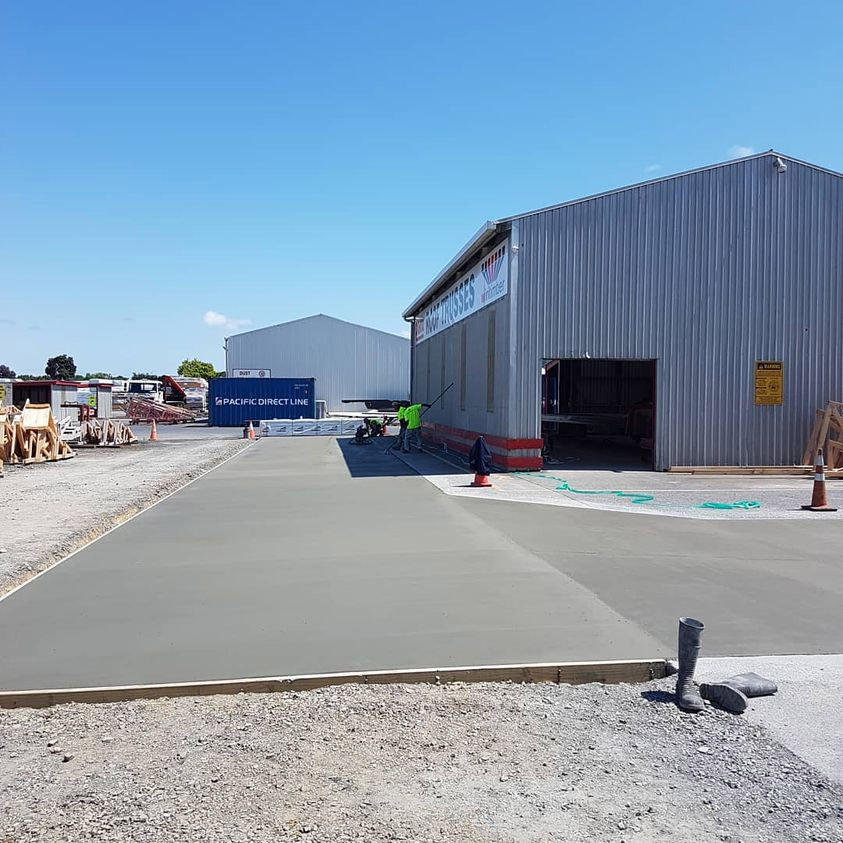

Commercial &
Industrial Concreting
Commercial & Industrial Concrete Contractors
Concrete-iT are award-winning Master Concrete Placers, available for commercial and industrial concreting projects in Auckland and the Greater Auckland region.
We’re experts in placing and finishing concrete. Concrete-iT services can include (but are not limited to): concrete slabs, concrete floors, driveways, vehicle crossings, pavements, paths, edging, kerbs and channels.
Full Contracts | Standalone Concreting Services
From consulting, design and site preparation, through to decorative concrete finishes, Concrete-iT offers an end-to-end, complete solution. Or we can provide standalone services.
- Siteworks & Excavation
- Demolition
- Drainage Sumps & Strip Drains
- Boxing (Formwork)
- Supply concrete & pumps
- Concrete Placing (pouring, laying)
- Floating & Trowelling
- Screeding & Levelling
- Concrete Grinding
- Decorative Finishes
- Acid Wash & Acid Etch
- Concrete Polishing & Concrete Sealing
Our Commercial and Industrial site preparation can include demolishing and removing existing concrete, asphalt, paving, cobbles, other hard landscaping, and building materials. See Siteworks & Excavation
Architectural & Decorative Concrete Finishing
Concrete-iT also has specialist expertise in architectural form finishes, and decorative concrete finishes. E.g. exposed aggregates, coloured concrete/oxides/staining, stamped concrete, patterned concrete, decorative cuts, and inlays such as metal strips, timber, glass, plastic.


Concrete-iT Plant & Machinery
- Excavators: 1.5 to 20 tonnes
- Bobcats
- Compactors
- Rollers
- Concrete Pumps: 20m to 40m
Award-winning Master Concrete Placers
The quality of our workmanship is reflected in our NZ Master Concrete Placers Association* awards in 2021, 2018 and 2017, for concreting projects in Auckland (*now the NZCCA).
We are professional concrete layers, and Concrete-iT is a member of the NZ Concrete Contractors Association (NZCCA). To quote the NZCCA:
‘Members are required to show a high standard of knowledge and practical experience which must be demonstrable, both in terms of workmanship and business acumen.
A NZ Concrete Contractors Association Member must abide by the Code of Ethics of the Association and be professional in all aspects of their business conduct. By setting a high standard for membership, those who employ a member of the NZCCA to carry out their work can be assured of a high standard of workmanship.’

FAQ: COMMERCIAL & INDUSTRIAL CONCRETING
Click to see Answers. If your question isn’t below, please contact Concrete-iT.
Can you provide client references for previous Commercial/Industrial work in Auckland?
Yes – please contact Concrete-iT for written references and/or previous clients’ contact details. You can also see Case Studies here.
What Health & Safety accreditations/qualifications does your team have?
Site Safe Certificates, Site Safe First Aid, Site Safe Safety Management.
Health & Safety compliance: Concrete-iT teams, equipment, excavation and siteworks comply with New Zealand regulations, including:
- The Health and Safety at Work Act 2015 (HSWA)
- The Health and Safety in Employment Regulations 1995 (HSE Regulations)
- The Health and Safety at Work (General Risk and Workplace Management) Regulations 2016 (GRWM Regulations)
How long does concrete need to cure?
Concrete should be cured for at least 24 to 48 hours before formwork is removed and the surface can be walked on. After 7 days*, the concrete is partially cured and strong enough for equipment and vehicles. After 28 days, concrete should be fully cured.
Poor curing can reduce concrete strength by up to 50%, and increase the risk of shrinkage-induced cracking, despite control joints being saw-cut. Cracking typically becomes noticeable after two weeks at the earliest and cracks can continue to widen for months. The risk of shrinkage cracking is minimised by using reinforcing, the correct positioning of control joints, compaction and using the appropriate concrete mix.
Effective curing also improves concrete durability and abrasion resistance.
How much does weather affect laying or curing concrete?
Temperature: The ideal temperature for curing concrete is about 20°C. Concrete-iT doesn’t lay/pour concrete at the hottest time of day, or when it is too cold (e.g. under 5 °C, as the concrete may freeze, then not cure properly).
Rain: It’s best to avoid placing (laying/pouring) concrete if it may rain. If the concrete has been floated, trowelled, and is nearing setting before it rains, the damage may be limited to marking on the surface.
How long does concrete last (and compared to asphalt)?
The life expectancy of concrete depends on factors such as: the quality of the installation, environmental conditions, and whether or not the concrete is kept well-maintained and not subjected to excessive loads. Concrete can last for up to 50 years (especially if it is sealed), asphalt up to 30 years.
Laid correctly, concrete can hold a higher load than asphalt, and asphalt is not as durable in high temperatures.
Should concrete be sealed?
Sealing extends the life of concrete and any decorative finishes used (especially coloured/stained/etched concrete). It’s cheaper and easier to apply a sealer every few years, then it is to repair cracked concrete. For driveways, Concrete-iT recommends sealing approx. every three years.
Sealing concrete protects it against wear and tear/abrasion, marks and stains. It also helps help prevent the growth of moss, mould and lichen. Sealing concrete also adds to the aesthetic appeal, which can add value to a property. Note: It’s important to use the right sealer, gloss level and slip-resistance – e.g. based on the concrete texture.
